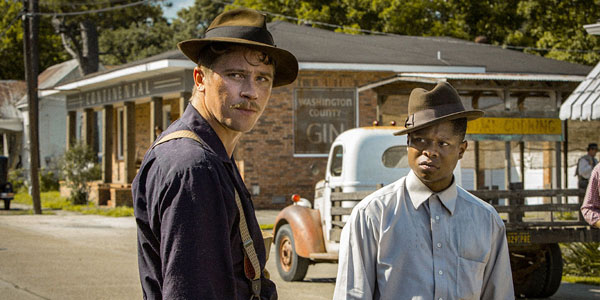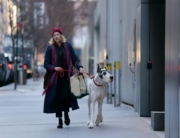![]() Mudbound is a fresh take on the old-fashioned, socially conscious, epic melodrama. In her third film, director Dee Rees impressively and assuredly expands from the intimate semi-autobiographical Pariah (2011) and the biopic Bessie (2015) to go on location for a stunning re-creation of rural Mississippi in the 1940s, with an equal-time ensemble of black and white families.
Mudbound is a fresh take on the old-fashioned, socially conscious, epic melodrama. In her third film, director Dee Rees impressively and assuredly expands from the intimate semi-autobiographical Pariah (2011) and the biopic Bessie (2015) to go on location for a stunning re-creation of rural Mississippi in the 1940s, with an equal-time ensemble of black and white families.
The opening scene occurs in a downpour and thrusts us into a confrontation centered on the two families over a muddy grave site that dramatically sets up that this film will be about racial conflict, nature, and the land. Rees refined Virgil Williams’s adaptation of Hillary Jordan’s best-selling 2008 novel by honing in on the two households, simplifying ancillary characters, and providing more hope than the harrowing original. The alternating chapters from each main character’s point of view are replicated through voice-over narrations of their inner thoughts, a device that works here because there is minimal dialogue within the resonant imagery.
The first narrator, Laura (Carey Mulligan), lets us know just how plain and naïve she felt as a 30-year-old spinster school teacher in urbane Memphis, Tennessee, and how flattered she was to be courted by Henry (Jason Clarke), a dour World War I veteran and civil engineer. They’re engaged by the time his charming and flirtatious brother Jamie (Garrett Hedlund) comes up from Ole Miss to twirl her around a dance floor, before he goes overseas into the Second World War.
We are as discomfited as she is when her husband uproots her and their small daughters to a bare, isolated farmhouse in the Delta, along with his sour, racist father they call Pappy (Jonathan Banks). Not only does Henry reveal a hidden dream to own land, but his motivation is to restore the family tradition that his father sold off after the Great Flood of 1927. A piano is all Laura has left of her old life.
Henry’s obsession with farming, however, is more informed by agricultural books and wishful thinking, compared to the sharecroppers who come with the property. While he determines to shed unproductive, and impoverished, white tenants—who are like Farm Security Administration photographs come to life—he needs the experienced assistance of the African American McAllan family: patriarch and self-taught minister Hap (Rob Morgan) and his wife, midwife Florence (a superb Mary J. Blige, unrecognizable as “the Queen of Hip-Hop Soul”). The couple shepherds their young children while they hope for the help of their eldest, Ronsel (Jason Mitchell), if he comes home safe from the war.
While the social restrictions of the Jim Crow South have been seen in movies, how it is tied up with the economics of the co-dependent, barely post-slavery, sharecropping system has not, where seed, animals, and machines are paid for in constantly re-calculated percentages of the crop. Henry adapts well to going along with the racial and gendered caste system to his benefit. But Laura finds she has to frequently reach out across race and class to the proud Florence for help, trying to establish a woman-to-woman bond.
Into this muddy stew return the two veterans who held off coming back to their old lives as long as they could. They return like a breath of fresh air through the stultifying heat, but both are suffering from post-traumatic stress, haunted by their battles (seen in effective flashbacks): Jamie in the air as a pilot and Ronsel from General Patton’s “Black Panther” tank battalion, though he has fond memories of German civilians treating him as an equal. Back at home, neither fits in with his family or the South anymore. The two veterans’ growing camaraderie, based on their war experience and shared booze, is an atypical threat to the social order. Ronsel is emblematic of the black servicemen who returned from making the world safe for democracy and resisted second-class citizenship in civilian life, and as a result, stirred up the brutal ire of the KKK.
The relationships and extended struggles among these intense personalities are always rooted in the Southern landscape, gorgeously filmed by cinematographer Rachel Morrison. When the film returns to the opening scene, there are as many layers of meaning as there are of mud. While the film is being released for wide distribution on Netflix, Mudbound will be seen to best total effect in a movie theater on the wide screen, for a doubtless appreciative audience.

















Leave A Comment